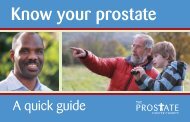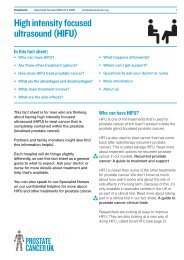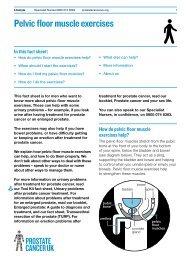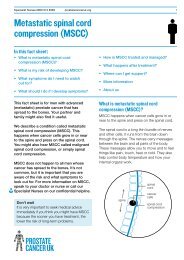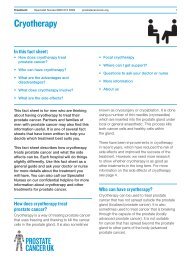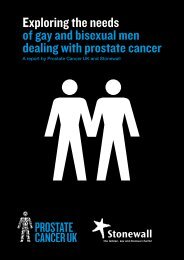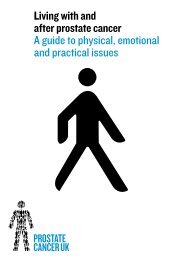Diet, activity and your risk of prostate cancer (pdf)
Diet, activity and your risk of prostate cancer (pdf)
Diet, activity and your risk of prostate cancer (pdf)
- No tags were found...
Create successful ePaper yourself
Turn your PDF publications into a flip-book with our unique Google optimized e-Paper software.
Which foods might increase my <strong>risk</strong> <strong>of</strong><strong>prostate</strong> <strong>cancer</strong>?Scientists think some foods might increase the <strong>risk</strong> <strong>of</strong> <strong>prostate</strong> <strong>cancer</strong>,particularly if eaten in large amounts. We need more research, but youmight want to reduce these foods in <strong>your</strong> diet.Whichfood?Dairy <strong>and</strong>calcium(dairy foodsare rich incalcium)Processed<strong>and</strong> red meatWell done<strong>and</strong> burntmeatFat <strong>and</strong>saturated fatAlcoholHow much should I eat?• We don’t know if it’s the calcium in dairy orsomething else that might increase <strong>your</strong> <strong>risk</strong>.• But more than 2000mg <strong>of</strong> calcium a day – about1.6 litres <strong>of</strong> milk – might have an effect.• Make sure you have some calcium - about 700mga day. You need it for strong bones.• Dairy foods include milk, yoghurt <strong>and</strong> cheese.• Other sources <strong>of</strong> calcium include sardines (withthe bones), green leafy vegetables, nuts, seeds<strong>and</strong> pulses.• Only eat processed meat occasionally. Thisincludes sausages, burgers, bacon <strong>and</strong> ham.• Limit the amount <strong>of</strong> red meat, such as beef, lamb<strong>and</strong> pork, to 400-450g (raw weight) a week.• Choose chicken, turkey or fish instead.• When meat is burnt it produces chemicals thatmight cause <strong>cancer</strong>.• Try to avoid eating burnt or very well done meat.• Cut down on saturated fats. These are found inmeat, dairy products, cakes, biscuits <strong>and</strong> pastries.• Choose healthier monounsaturated <strong>and</strong>polyunsaturated fats. They are found in olive <strong>and</strong>vegetable oils, avocados, nuts, seeds <strong>and</strong> oily fish.• Stay within the government guidelines – don’tregularly drink more than 3 to 4 units a day.



